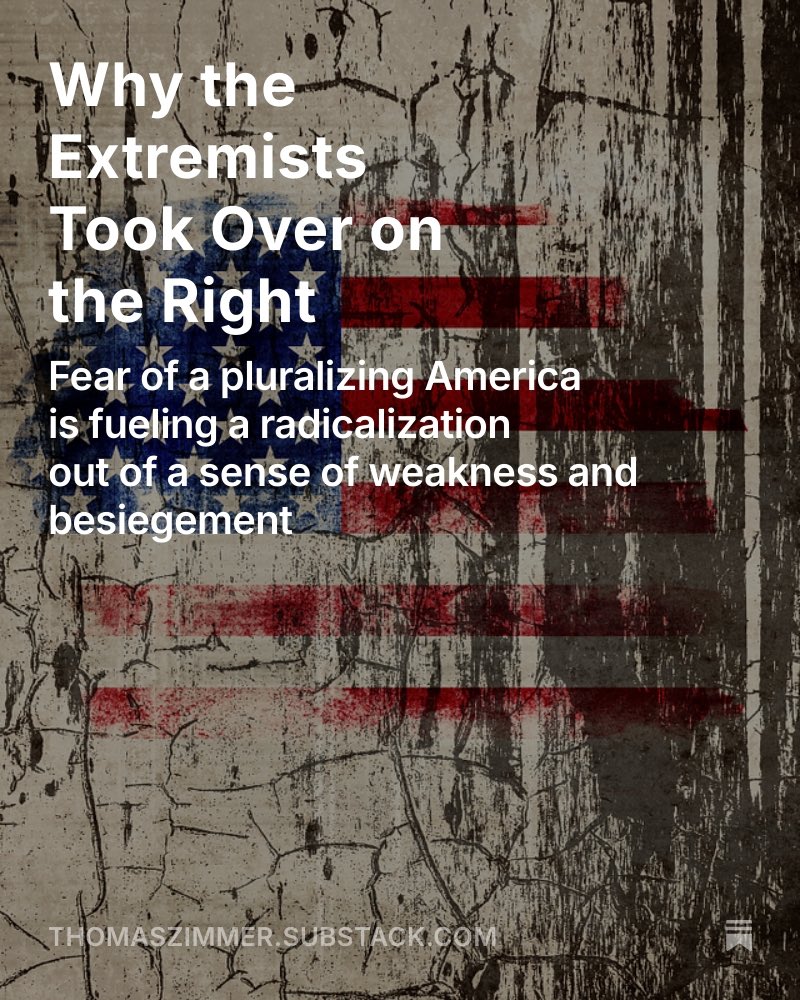I find this question, prompted by @SethCotlar’s criticism of what he rightfully calls the "naïve, American Exceptionalist idea that 'it can’t happen here'," really interesting. A few thoughts from a German perspective. 1/
https://twitter.com/taylorgrayson/status/1311333926368051205
I’m not necessarily an expert on this topic and have not been following the debate among German conservatives super closely (keeping up with what’s happening on the American side of the Atlantic keeps you pretty busy these days…). So these are really just a few thoughts. 2/
Interestingly, German post-war history has been shaped by almost the reverse exceptionalist idea: "It happened here, so it can always happen again, and it is our responsibility to make sure that it won’t, at least not here." 3/
By the late 1980s, the Federal Republic’s national identity, if there was such a thing, centered around the Nazi period and specifically the Holocaust, and focused on the way West Germany had democratized and accepted the mass crimes as a defining feature of its own history. 4/
A very peculiar kind of national pride had developed, articulated most clearly by the left: "Look how far we’ve come since 1945, look how we have accepted the responsibility that results from our history." A sense not of collective guilt, but responsibility. 5/
To be clear, the exact place of the Holocaust in Germany’s history and collective memory, and the question of whether it should have any relevance for German politics, society, and culture in the present have always been contested. 6/
But by the 1990s an elite consensus around these issues had developed, one that was supported at least by mainstream conservative politicians and elites. No one in the Merkel wing of the conservative party, for instance, would question the centrality of the Holocaust. 7/
Not everyone shares that view, of course. There have always been attempts, particularly on the right, to decenter the Nazi period and the Holocaust – by focusing more on the “good” parts of German history: Goethe maybe, or Frederick the Great if you are so inclined. 8/
Since the Reunification in 1990, the calls for a "normalization" have become louder – as in: The past is the past, and now we’re just a "normal" country. To me, the "normalization" discourse got particularly annoying when Germany hosted the soccer World Cup in 2006. 9/
People were wearing jerseys, waving flags, singing the anthem – all fine; but some pundits got a little too excited: “See how normal we are? Can’t you see?!” As if the normalization fetish itself wasn’t proof that something was not quite “normal.” 10/
The debate over of how "normal" Germany was has always focused on history. In 2012, Cambridge historian Chris Clark published The Sleepwalkers, arguing that we needed to revise our understanding of the German Empire being mainly responsible for the First World War. 11/
In Clark’s interpretation, the major powers were all to blame, as they all “sleepwalked” into the Great War. The book was especially well received in Germany – with certain commentators getting all hyped up about the supposed exoneration of the Empire. 12/
And the debate quickly turned to the present and Germany’s role in the world: Since it was now "proven," some argued, that Germans had not been the big baddies of the past, was it not time to finally step out of history’s shadow and be a "normal" nation? 13/
What do "normal" nations do, you ask? Well, according to this interpretation, they pursue a more "robust" national interest in foreign policy and stop being so "subservient" to the rest of Europe, for instance. 14/
(Interestingly, the "Chris Clark proves we were never the baddies!" crowd conveniently neglected to address the Hitler-sized elephant in the room… but hey, history is hard.) 15/
Unsurprisingly, Germany’s far-right party AfD is full of people who think it’s a crime against the nation to focus on the Holocaust, reject any notion of collective responsibility emanating from German mass crimes, and don’t care about the "don’t let it happen again" part. 16/
Then again, so far, the other parties – including the conservative CDU/CSU – have pledged not to cooperate with the AfD in any way. I dare not make predictions as to how long they will hold that line. But so far, they have. 17/
There are certainly forces within the conservative CDU/CSU and the "liberal" (libertarian/conservative mostly, really) FDP that are open to cooperating with the AfD. But so far, those forces have been kept in check. 18/
One reason why is the fact that the "It happened here, so it can always happen again, and it is our responsibility to make sure that it won’t" mantra is still exerting a strong influence, shaping what is seen as legitimate and what is deemed out of bounds in German politics. 19/
The “exceptionalism,” if we want to call it that, still holds. But again, these are just a few thoughts, and I’d love to hear what others who know more about the German side think. Certainly fascinating to tackle the “Can it happen here?” question comparatively. /end
Addendum: This is an absolutely crucial point, and I completely agree – it is very, very concerning.
https://twitter.com/davi_cath/status/1311685311102099458?s=20
• • •
Missing some Tweet in this thread? You can try to
force a refresh






